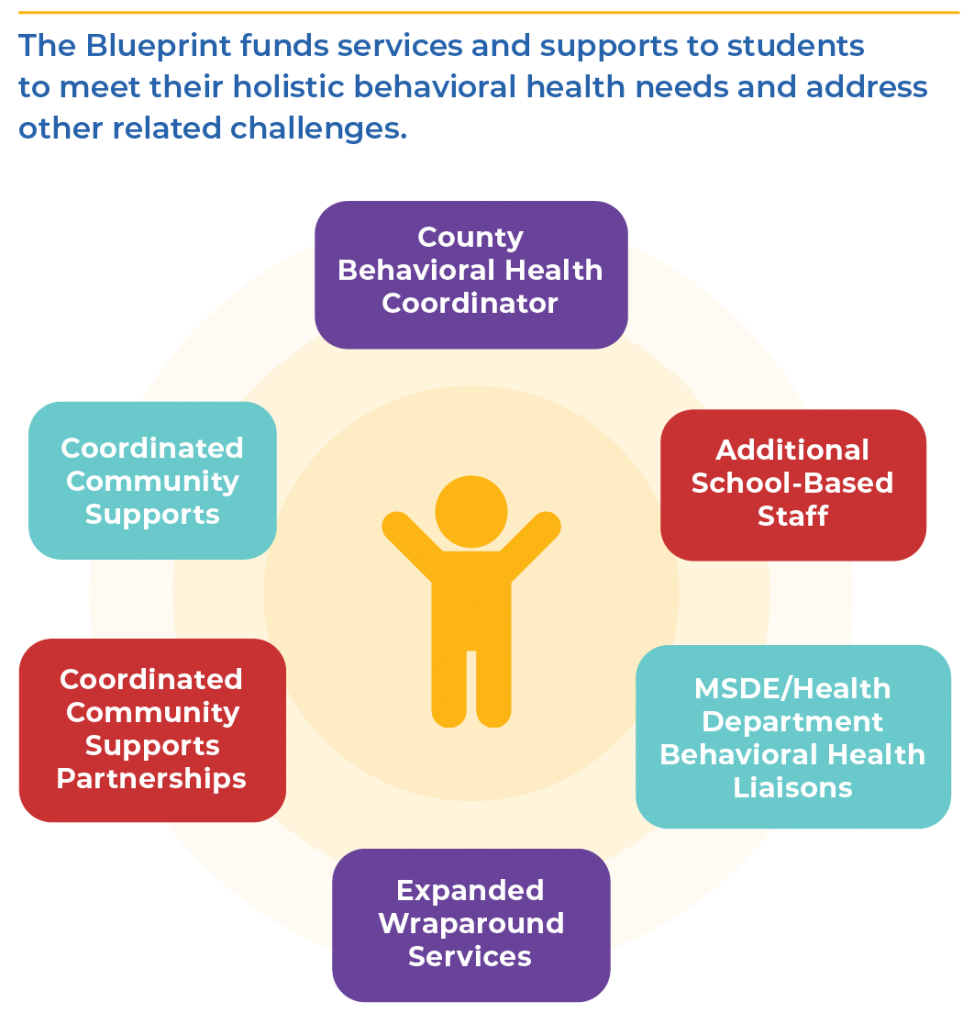Behavioral Health Expansion
The Blueprint Funds Expanded Staffing and Coordinated Community-Level Supports
Learn more about the Blueprint for Maryland’s Future at marylandeducators.org/Blueprint.
Right now, staffing levels for counselors and psychologists in Maryland’s schools are poor. The American School Counselor Association recommends a student-per-counselor ratio of 250:1; Maryland’s current ratio is 327:1. For psychologists, it’s even worse. The National Association of School Psychologists recommend a ratio is 500-750 students:1 psychologist; Maryland’s current ratio is 1,027:1. This disturbing shortage leaves many students underserved and staff overwhelmed.
The Blueprint funds the hiring of 15,000 additional educators, including behavioral health professionals, paraeducators, and more. This means more time for educators to recognize student need, provide individualized attention, and refer to programs and services which the Blueprint expands.
The new Concentration of Poverty (COP) School Grants also provide funding of new positions through personnel and per pupil grants to increase attention to behavioral health and its impact on student learning—adding more expert school psychologists and school counselors, as well as teachers, specialists, and paraeducators, so more students have access to more supports. The Blueprint started to phase in this funding in FY 2020, adding more every year until 2027 when a predicted 557—nearly one-third of all schools in the state—are projected to receive the COP grants.
The Blueprint provides a master’s level behavioral health coordinator for each local school system whose job is to coordinate services and referral procedures to ensure that students receive appropriate, timely, sustained, and continuous care with existing social services and health departments and through a new structure of coordinated community-based supports and partnerships. The coordinator must also develop and implement a standardized screening to identify students with behavioral health services. Both local coordinators and school-based providers are supported by designated MSDE and State Department of Health staff.
Under the Blueprint, the behavioral health coordinator and the local school system must develop a plan that allows all students some exposure and access to behavioral health programming and services and must have a plan in place to connect all students to community-based services if there is not a school-based health center in their school.
The Blueprint also creates a new Maryland Consortium on Coordinated Community Supports—a 20-member group that includes educators (including one MSEA designee), a school psychologist, a school social worker, local and state officials, and others. Coordinated Community Supports are defined as educators, schools, non-profits, health departments, parents, and others who provide holistic, non-stigmatized, culturally competent, family-driven, youth-guided, and coordinated community-centered services that can partner to provide the services students and families need. The consortium supports Coordinated Community Supports Partnerships, including a grant program to support partnerships and develop metrics to assess a partnership’s success.
The Consortium must submit a report every July 1 to the Blueprint’s Accountability and Implementation Board (AIB), the governor, and the General Assembly that must detail its progress, including coordinated community supports partnerships and the areas served by the partnership, grants awarded to coordinated community supports partnerships, and all other activities of the consortium.
*Maryland’s fiscal year runs from July 1 through June 30 of the following year.
The Blueprint funds services and supports to students to meet their holistic behavioral health needs and address other related challenges.
Blueprint Funding for the Coordinated Community Supports Partnership Fund
| Fiscal Year | funding amount |
| FY 2022 | $25 million |
| FY 2023 | $50 million |
| FY 2024 | $75 million |
| FY 2025 | $100 million |
| FY 2026 and beyond | $125 million |
What Are Wraparound Services?
The Blueprint provides an extensive definition of the wraparound services essential to the holistic well-being of a child. These services—integral to the expansion of community schools—are, in the Blueprint, considered as essential to every student’s ability to learn and thrive in school. Through the Coordinated Community Supports Partnerships, these wraparound services must be made available to every child in every school. Wraparound services as defined in the Blueprint means:

- Enhanced behavioral health services, including access to mental health practitioners and school staff trained in trauma–informed interventions
- Improving the learning environment at the school
- Any professional development for teachers and school staff to quickly identify students who need behavioral health resources
- Improving student attendance
- Additional social workers, mentors, counselors, psychologists, and restorative practices coaches
- Extended learning time, including before and after school, weekends, summer school, and an extended school year
- Safe transportation to and from school and off–site apprenticeship programs
- Vision and dental care services, establishing or expanding school–based health center services, and enhancing physical wellness
- Providing family and community engagement and supports
- Connecting families to Judy and Patty centers and other family support programs
- Enhancing student enrichment experiences, including educational field trips, partnerships, and cultural arts programs institutions

